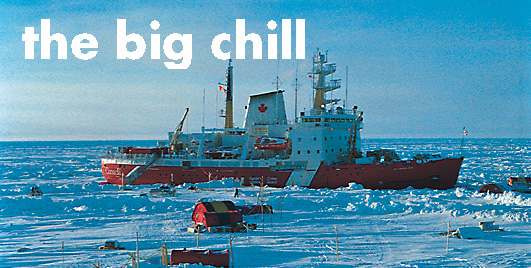

As I stand on the bridge of the icebreaker Des Groseilliers, there isn't even the faintest motion under my feet. That's because the ship isn't just floating on water--it's also solidly frozen into the Arctic ice pack, at least for now.
A month before I arrived strong winds and roiling ocean currents twisted the ice around the ship. Listening to the grinding sound of ice on metal, crew members on the lower decks might have thought they were steerage passengers on the Titanic. A thick floe slid along one side of the ship and a second, moving in the opposite direction, scraped along the other side.
Unlike the Titanic, this ship's hull is designed to take the impact. But the power of the ice forced the 322-foot vessel backward and then began shoving it forward toward huts and scientific research labs on the frozen water, the largest of which could not be moved out of harm's way.
The ship came to a halt after a tense period, but the story leads me to ask something as I stand on the bridge with Captain Claud Langis. Notepad and pen at ready, I say, "So, uh, how much pressure can the hull take?"
"I don't know," he replies.
The "theory" is that the rounded bottom of the ship should cause it to pop up out of the ice if the pressure becomes too great, just as an ice cube pops out of an ice cube tray. No one has precise measurements, however, because the Des Groseilliers is the first vessel in more than a century to be frozen into the ice pack on purpose.
Our ship has been sitting here, 300 miles north of Prudhoe Bay, Alaska, for six months to better understand the climate of the Arctic. It still has another seven months to go. When its time on the ice is over, scientists should know more about how the Arctic works, improving forecasts of global climate.
The Arctic Ice Cap: One of the Last Unexplored Regions of
the Earth
Life on the Ice: Minus 45 Degree Weather
and Lobster Salad
Dangers Include Polar Bears and
Ice Break-Ups
Total Meltdown? Ice Cap Future in
Question
Send a letter to the editor at columns@u.washington.edu.